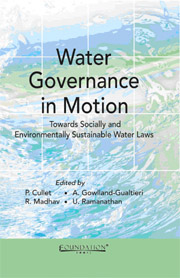Book contents
- Frontmatter
- Contents
- Acknowledgments
- Contributor Biographies
- Introduction
- I Water Law, Policy and Institutional Reforms in India
- II Ongoing Irrigation and Ground Water Reforms in India
- III Perspectives on Privatisation
- IV Environment and Human Rights
- 12 Balancing Development and Environmental Conservation and Protection of the Water Resource Base: The ‘Greening’ of Water Laws
- 13 The Right to Water as a Human Right or a Bird's Right: Does Cooperative Governance Offer a Way Out of a Conflict of Interests and Legal Complexity?
- 14 South Africa's Water Law and Policy Framework: Implications for the Right to Water
- 15 Respect, Protect, Fulfill: The Implementation of the Human Right to Water in South Africa
- V Comparative Perspectives on Reforms
- Bibliography
15 - Respect, Protect, Fulfill: The Implementation of the Human Right to Water in South Africa
from IV - Environment and Human Rights
Published online by Cambridge University Press: 26 October 2011
- Frontmatter
- Contents
- Acknowledgments
- Contributor Biographies
- Introduction
- I Water Law, Policy and Institutional Reforms in India
- II Ongoing Irrigation and Ground Water Reforms in India
- III Perspectives on Privatisation
- IV Environment and Human Rights
- 12 Balancing Development and Environmental Conservation and Protection of the Water Resource Base: The ‘Greening’ of Water Laws
- 13 The Right to Water as a Human Right or a Bird's Right: Does Cooperative Governance Offer a Way Out of a Conflict of Interests and Legal Complexity?
- 14 South Africa's Water Law and Policy Framework: Implications for the Right to Water
- 15 Respect, Protect, Fulfill: The Implementation of the Human Right to Water in South Africa
- V Comparative Perspectives on Reforms
- Bibliography
Summary
Introduction
Water services in South Africa have started a hot debate. On one hand, the state is often regarded as being at the forefront in terms of water services provision particularly due to its explicit acknowledgement of the human right to water and its Free Basic Water (FBW) Policy. On the other hand, South Africa is a country suffering from extreme inequalities. Its GINI index is extremely high with 57.8. Also, access to water is extremely uneven, a legacy of the apartheid era. Historically ‘white’ suburbs account for more than 50 per cent of residential water use with ‘whites’ just comprising roughly 10 per cent of the population. A great number of people still lack access to water services, mostly marginalised and vulnerable groups of society. Many more suffer from high prices and the use of unsafe water. These inequalities in access to safe and affordable water have caused much resistance against water service commercialisation, privatisation and cost recovery on which the government mainly relies to expand services.
This chapter tries to achieve a balanced view from a human rights perspective recognising the country's achievements, but also taking a close look at the challenges in the implementation of the right to water. It analyses the implementation of the human right to water in South Africa in regard to the obligations borne by the state that correspond to the right to water under the common tripartite distinction between obligations to respect, protect and fulfill.
- Type
- Chapter
- Information
- Water Governance in MotionTowards Socially and Environmentally Sustainable Water Laws, pp. 415 - 444Publisher: Foundation BooksPrint publication year: 2010
- 1
- Cited by

